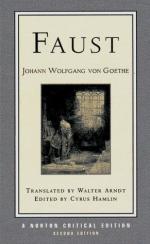Tycho Mommsen, in his excellent essay, Die Kunst des Deutschen Uebersetzers aus neueren Sprachen, goes so far as to say: “The metrical or rhymed modelling of a poetical work is so essentially the germ of its being, that, rather than by giving it up, we might hope to construct a similar work of art before the eyes of our countrymen, by giving up or changing the substance. The immeasurable result which has followed works wherein the form has been retained—such as the Homer of Voss, and the Shakespeare of Tieck and Schlegel—is an incontrovertible evidence of the vitality of the endeavor.”
[C] “Goethe’s poems exercise a great sway over me, not only by their meaning, but also by their rhythm. It is a language which stimulates me to composition.”—Beethoven.
The various theories of translation from the Greek and Latin poets have been admirably stated by Dryden in his Preface to the “Translations from Ovid’s Epistles,” and I do not wish to continue the endless discussion,—especially as our literature needs examples, not opinions. A recent expression, however, carries with it so much authority, that I feel bound to present some considerations which the accomplished scholar seems to have overlooked. Mr. Lewes[D] justly says: “The effect of poetry is a compound of music and suggestion; this music and this suggestion are intermingled in words, which to alter is to alter the effect. For words in poetry are not, as in prose, simple representatives of objects and ideas: they are parts of an organic whole,—they are tones in the harmony.” He thereupon illustrates the effect of translation by changing certain well-known English stanzas into others, equivalent in meaning, but lacking their felicity of words, their grace and melody. I cannot accept this illustration as valid, because Mr. Lewes purposely omits the very quality which an honest translator should exhaust his skill in endeavoring to reproduce. He turns away from the one best word or phrase in the English lines he quotes, whereas the translator seeks precisely that one best word or phrase (having all the resources of his language at command), to represent what is said in another language. More than this, his task is not simply mechanical: he must feel, and be guided by, a secondary inspiration. Surrendering himself to the full possession of the spirit which shall speak through him, he receives, also, a portion of the same creative power. Mr. Lewes reaches this conclusion: “If, therefore, we reflect what a poem Faust is, and that it contains almost every variety of style and metre, it will be tolerably evident that no one unacquainted with the original can form an adequate idea of it from translation,"[E] which is certainly correct of any translation wherein something of the rhythmical variety and beauty of the original is not retained. That very much of the rhythmical character may be retained in English, was long ago shown by Mr. Carlyle,[F]




